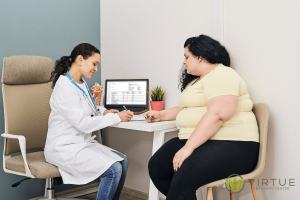Key Takeaways
- Pregnancy can trigger or worsen binge eating for many women, making support crucial.
- Specialized eating disorder treatment programs address both emotional and physical aspects of recovery.
- Structured programs like partial hospitalization provide safe, consistent care during the transition from pregnancy.
- Understanding and treating conditions like OSFED (Other Specified Feeding or Eating Disorders) ensures comprehensive healing.
- Holistic care combining therapy, nutrition guidance, and emotional support improves long-term recovery outcomes.
Introduction
Pregnancy is a time of profound change, both physically and emotionally. While it brings joy, it can also trigger challenges like binge eating. Many women find themselves struggling with urges to overeat, feelings of guilt, or body image concerns after giving birth. Addressing these issues with eating disorder treatment is critical to support both mental and physical health during postpartum recovery. Effective treatment programs focus on the whole person. They combine therapy, nutrition support, and structured care to help women regain control over their eating habits while navigating the emotional complexities of motherhood. For many, this journey is a key step toward lasting health and wellness.How does pregnancy influence binge eating disorder?
Pregnancy affects hormones, metabolism, and emotional regulation, which can exacerbate binge eating tendencies. Women may also experience increased stress, sleep deprivation, or postpartum body image concerns, which contribute to disordered eating patterns. Research shows that pregnancy can both trigger new binge eating behaviors and worsen pre-existing eating disorders. Understanding this connection helps treatment providers create tailored plans that address both emotional and physical recovery.
What is the role of structured treatment programs like partial hospitalization?
Structured care can provide the consistency and support needed during the sensitive postpartum period. Programs like the Partial Hospitalization Program offer intensive daily treatment while allowing women to remain at home in the evenings. This structure helps patients gradually regain control over their eating habits and coping strategies. These programs combine therapy, nutrition counseling, and medical supervision to create a safe space for recovery. Women receive guidance on portion control, emotional regulation, and self-compassion, all while addressing the unique stressors of motherhood.How does OSFED affect postpartum eating disorder treatment?
OSFED, or Other Specified Feeding or Eating Disorders, is common among postpartum women. Symptoms may include binge eating, restrictive eating, or compensatory behaviors that don’t meet full criteria for classic disorders like anorexia or bulimia. Tailored eating disorder treatment programs recognize the nuances of OSFED and provide individualized care. Treatment plans may include cognitive behavioral therapy, mindfulness practices, and nutrition support, ensuring all aspects of the disorder are addressed.
How do therapy and nutrition support recovery?
Therapy plays a central role in helping women understand emotional triggers for binge eating. Cognitive behavioral therapy (CBT) and other evidence-based approaches help patients reframe negative thoughts and develop healthy coping mechanisms. Support groups provide community and shared understanding, which can be empowering during postpartum recovery. Nutrition counseling focuses on rebuilding a healthy relationship with food. This includes learning balanced meal planning, mindful eating practices, and addressing nutritional deficiencies that may have developed during pregnancy. Together, therapy and nutrition support create a strong foundation for recovery. Recent research underscores the importance of comprehensive, multidisciplinary care for postpartum binge eating.What additional supports can aid postpartum recovery?
Education and awareness are critical. Resources like the National Eating Disorders Association’s pregnancy guide provide practical tips and guidance for new mothers navigating disordered eating. Online and video resources, such as Binge Eating Recovery: A Journey to Freedom, offer insight and inspiration from others who have successfully navigated similar challenges. These supports can supplement structured programs, helping women stay motivated and connected. Moreover, self-care practices such as journaling, mindfulness exercises, and gentle physical activity can enhance emotional regulation. Engaging in these practices alongside professional care helps women manage stress, reduce binge urges, and build confidence in their recovery journey. Connecting with others who share similar experiences fosters a sense of community, which is invaluable for long-term healing.Conclusion
Recovering from binge eating after pregnancy requires compassion, structure, and evidence-based care. A specialized eating disorder treatment program addresses emotional triggers, nutritional needs, and the unique challenges of postpartum life. Programs like partial hospitalization and OSFED-focused care provide the consistency and support women need to regain control over their health and well-being. If you or a loved one is struggling with postpartum binge eating, Virtue Recovery Las Vegas offers tailored, compassionate programs to guide women through recovery. Call 866-520-2861 or visit the contact page to take the first step toward lasting healing.Are There Connections Between Artificial Food Dyes and Binge Eating Recovery After Pregnancy?
Research on the impact of artificial food dyes on eating disorders suggests that these additives may influence appetite regulation. After pregnancy, women experience significant hormonal changes, which can make them susceptible to binge eating. Understanding this connection could lead to better dietary recommendations for postnatal recovery.
FAQs
How common is binge eating after pregnancy?
Pregnancy can trigger or worsen binge eating, affecting both first-time and experienced mothers.What is OSFED, and how does it impact treatment?
OSFED includes eating disorders that don’t fit classic categories. Tailored treatment addresses these unique symptoms.How does partial hospitalization help postpartum recovery?
It provides structured daily care while allowing patients to remain at home, offering both support and flexibility.Can therapy alone help with postpartum binge eating?
Therapy is essential but most effective when combined with nutrition guidance and structured treatment programs.Are there online resources for postpartum binge eating recovery?
Yes. Resources like the National Eating Disorders Association pregnancy guide and educational videos help supplement structured care.Resources
- WomensHealth.gov. Binge Eating Disorder and Pregnancy. 2023. https://womenshealth.gov/mental-health/mental-health-conditions/eating-disorders/binge-eating-disorder
- PMC. Postpartum Eating Disorders: Assessment and Intervention. 2022. https://pmc.ncbi.nlm.nih.gov/articles/PMC9745253/
- National Eating Disorders Association. Pregnancy and Eating Disorders. 2021. https://www.nationaleatingdisorders.org/pregnancy-and-eating-disorders/









